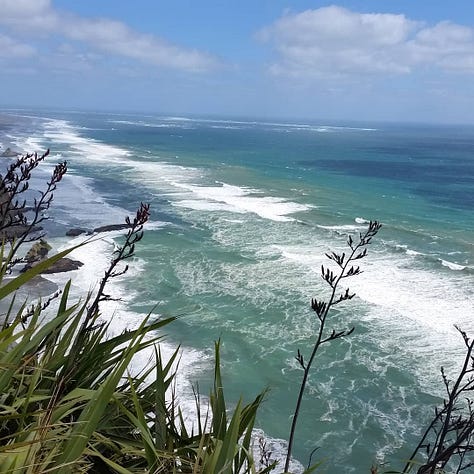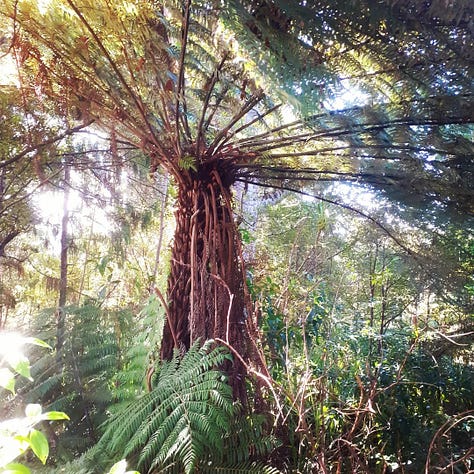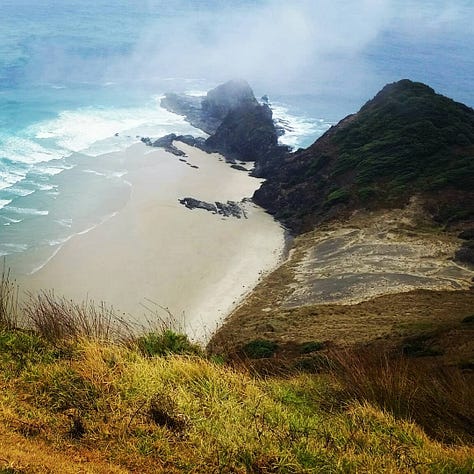


There’s a Māori word, tūrangawaewae, that doesn’t quite have an equivalent in English. A close approximation might be ‘a place to stand’. It refers to the piece of land to which you belong. Your foundation, your place in the world, your home.
There’s something very appealing about identifying yourself in relation to a piece of land, a mountain, a waterway. There’s a solidity in that, an anchor, that helps to ground you and show you which way is up.
It raises complex questions for someone who’s an immigrant though. At times I use the term ‘home’ to mean the place of my birth, my roots, my ancestry. Other times it refers to my chosen home of the past 18 years, where my day-to-day living unfolds.
It happens that my two homes, the UK and New Zealand, are almost exact opposites on the globe. When one is day, the other is night. When one is winter, the other is summer. It takes a full day (or more) to travel between them. Plus a week (or more) for the fractured pieces of my being to reintegrate on the other end of that flight.
I didn’t plan to splinter my life across hemispheres. I set out on what I thought was a transient adventure. A year overseas, expanding my horizons, stepping out of my comfort zone, and outrunning a broken heart. But life has its own trajectory. One thread led to another until, four years in, I’d established a web of new connections, and realised this land of Aotearoa New Zealand had accidentally become a ‘home’ too.
The life of an immigrant is, in many ways, a life of expansion, of possibility, of adventure. A life that’s not anchored by roots or constrained by history. But it is also a life of fragmentation, loss, and grief. It can be liberating. It can be lonely. It can feel like being cast adrift in the universe, untethered and at risk of floating away unnoticed.
Once you allow a second home to take root in your heart, it means forever being split in two and forever wondering which way is up. Your heart belonging, in different ways, to different people, cultures, traditions, and lands. Like being torn between two lovers, it’s a conundrum that’s hard to resolve. It demands that we make space for both, while also forcing us to make a choice – it’s hard to live day-to-day in two places at once. Whatever you end up choosing, vital pieces of your life and your heart are missing.
There are two versions of me that embody these two different lives. They are intimately acquainted, but they’re not the same.
As I step off the plane at Heathrow, a young vibrant part of myself kicks into gear. She loves art, music, fashion, culture. She loves the buzz of urban life and thrives on the excitement that comes with being at the centre of things.
As the plane descends over the coastline of Aotearoa, I feel my heart and soul connect to the vast ocean, rugged cliff faces, and dense native bush. I connect to a more spacious and spiritual part of myself who loves wild untamed nature, and the quiet that comes with fewer people and more space. It allows me to settle and hear the vibration of the world around me.
Although on a surface level my two homes are not so culturally different – both Westernised, English-speaking nations – they speak to very different parts of my psyche. This conversation with the land shapes me and nudges me in particular directions.
I’m curious about the power of landscapes to resculpt our narrative and identity. I’m curious how those who were forced from their homelands, in fear of their lives, navigate this, particularly when there is no possibility of return.
I’m curious too how our ancestors fared, who had to spend six months on a boat to arrive in new and unknown lands. What were they escaping from in the homeland that led them to sever those connections so profoundly? Or is it simply human nature to always reach for something new? To always imagine a better, happier future just a hair’s breadth out of reach, just beyond the next horizon?
The search for home is not unique to immigrants. In many ways, the conflicts that bring people to the therapy room are often a quest for a sense of belonging and inner peace. A desire to feel at home within our own being. When we’re troubled, distressed, or dysregulated, there’s a sense of being far from home, lost at sea.
Perhaps all of us are ultimately seeking a secure home base. On a relational level, a sense of home can be found in safe and secure attachments, deep intimacy, and connection to others. On this level, home is where my husband and kitty cats are.
But there’s a sense of home that can transcend people and place too. A sense of home we can source within ourselves, within our bodies, within our soul.
We can catch glimpses of it when the body and mind are quiet. When we’re resting in the safety and calm of a balanced and harmonious nervous system. When the mind is spacious and the body is at ease. When we’re connected in the here and now to what is unfolding around us. When we’re tapped into creativity, immersed in play, or in a state of flow.
We can source it in the wider universe, in our connectivity to Mother Nature and to life itself. The sense of interconnectedness among all beings.
This home is with us wherever we are. It’s the home ground that does not leave us and, although it can become obscured and hard to access at times, it’s with us from the moment of our birth to the moment of our death (and perhaps beyond, depending on your beliefs).
We can cultivate practices that increase our access to this place. The journeys we take in the therapy room and on the yoga mat or meditation cushion can bring us closer to this sense of home and belonging. My yoga practice has become a home of sorts, one I’ve returned to every day for over a decade, no matter my circumstances or physical location. We can find it in the garden, with our hands in the earth. Or listening with deep compassion to the suffering of our fellow humans.
As an immigrant, home can be everywhere (on a good day) and nowhere (on a bad day). The questions this evokes have led me to dig deeper, to seek the stability and belonging I crave. It’s a worthwhile quest, wherever you find yourself. Perhaps ultimately home is an internal place, instead of, or as well as, an external place. I’m most at home when I’m rested and regulated. When I experience a sense of safety and trust within myself. When I step momentarily outside the worries of the human mind and become aware of my connection to something larger. When I feel my place within the Cosmos.
I’d love to hear from you. Where do you sense the glimmers of belonging? Do you find your sense of home in a practice, a person, or a place? Is there a piece of land that anchors you – your tūrangawaewae? Are there ways you find this home ground within our own being?
If you like what you read here, you can support The Therapy Room in a number of ways - by subscribing, liking, and sharing this post. Or, if you feel able, by upgrading to a paid subscription. Paid subscriptions help me to carve out time for writing in my self-employed life. You can think of it as buying me a coffee (or more likely a tea) to show your appreciation. Part of the subscription also helps to fund Substack to run this fabulous ad-free platform.











Love this. I found no welcome in motherland (Iran) as I escaped socio-political tyranny to come to stepmother land (US) where I am also unwelcomed. So i found it in Mother Earth. And that changed my entire life orientation and sense of belonging and connection to nature and my nature.
I love this, my experience is very similar. I was an intentional, yet very ambivalent immigrant, moving from South Africa to Australia, with our 2 little boys nearly 18 years ago. We have moved so much over these past years, never staying in 1 place for more than a few years, always looking for a place that feels more like home. I am slowly coming to the realization that home has to be a place in my heart - that in straddling 2 worlds, always missing my people back home, and also appreciating the opportunities Australia has given us, I will forever feel split, torn in half. Wanting to go back yet at the same time appreciating and acknowledging that Australia is home to my now adult sons, for whom South Africa is just a collection of fond memories. Home is becoming a place I experience within myself, that I can create and nurture. 💙